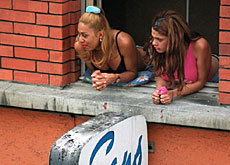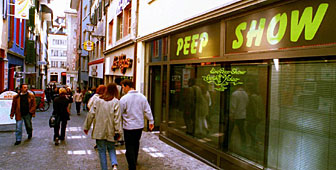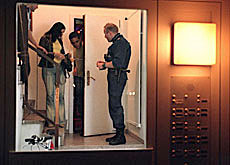Window ban for Zurich’s prostitutes

Zurich's prostitutes are facing new legislation aimed at keeping their activities strictly behind closed doors.
The city parliament has introduced a ban on “window prostitution” which had led to comparisons between Zurich and Amsterdam.
Registered prostitution in licensed brothels has been permitted across Switzerland since 1992. But street prostitution remains illegal, except for in certain areas specifically designated by local authorities.
The city council says that prostitutes in Zurich have been seeking to get around the street ban by displaying themselves in windows and attracting passing customers.
“The prostitutes are trying to flout the regulations which are in place to protect the population from unreasonable noise and other disturbances,” argued the council in the preamble to its new proposals.
“The sharp rise in this so-called window prostitution has led to talk of a real ‘Amsterdamisation’ of Zurich.”
The proposals were accepted by the city parliament on Wednesday.
Despite being a member of the city council herself, social services chief Monika Stocker says she’s not keen on the Amsterdam comparisons, telling swissinfo: “Zurich is Zurich and has its own problems to concentrate on.”
Social challenge
The Green Party politician agrees with her colleagues, however, that prostitution is one of the biggest social challenges facing the city.
Last year 467 new prostitutes were registered in Zurich, an increase of more than a third on the previous year, bringing the total number of legal prostitutes up to around 3,000.
The number of unregistered prostitutes is difficult to estimate but more than 300 were arrested by police in 2002.
With a general population of just 364,558 living in Zurich, approximately one woman in 55 would appear to be working in the city’s sex industry.
According to rough estimates provided by the European HIV prevention network, Europap, that puts Zurich a lot closer to Amsterdam (one woman in 35) than to large cities such as London (one in 300).
Concerned
“Of course I’m concerned about the figures from a sociological point of view,” says Stocker, “because it alarms me that so many women are getting involved in prostitution. It also makes me wonder what the whole emancipation movement was for.
“But the numbers alone aren’t the problem, since prostitution isn’t in itself illegal. The problem lies more in the use of prostitution to cover illegal immigration – the import and export of women, so to speak – along with extortion, money laundering and drug trafficking.”
One doesn’t have to walk far from Stocker’s offices to see the problem at its worst. Stretching out behind the city’s main train station, Langstrasse and its surrounding area have become the main stomping ground for Zurich’s illegal prostitutes.
Intolerable
Although Langstrasse has long been known as an “entertainment district”, its generally low-income residents complain that the size of the local sex industry has reached intolerable levels in recent years, forcing many to leave the city.
“People are moving out of the area at quicker rates than in any other community in Switzerland,” says Rolf Vieli, head of the Langstrasse Plus project.
“This remains a residential area, though, where around 80 per cent of the inhabitants are just regular people – people who are being kept awake all night by the disturbances.”
Vieli hopes that the new legislation, along with a new council scheme to convert former brothels into apartments, will help reduce the sex industry’s high profile in the area. But the prostitutes and their supporters are already fighting back.
Sex area
“Langstrasse has always been an area where people go for sex,” says Lea Bösiger, a counsellor at the Isla Victoria prostitution advice centre. “Now people are saying they want to turn it into a ‘nice’ area but they forget that the prostitutes have a right to live somewhere too.
“These people say they want safe places for children to grow up, but again they forget that many of the prostitutes are also mothers who want the same thing. If the people who want to clean up Langstrasse are so concerned about society, they should also think about what life is like for the prostitutes.”
Back in her office overlooking Langstrasse, Monika Stocker says she shares Bösiger’s concerns about the city’s failure to find alternative careers for the prostitutes – many of whom come from abroad with little knowledge of Switzerland or its languages.
Less liberal
But despite this concern, Stocker admits that the new ban on window prostitution marks a significant step back from the liberal attitudes of recent years.
“There’ll be no going back to prohibition,” Stocker reckons. “Zurich has seen in the past that that doesn’t work, most recently in the fight against drugs.
“But although we still want a liberal, open world, it is necessary to set limits so that we don’t get the kind of excesses currently visible in Zurich.”
Stocker concedes that the window ban will not radically alter the city’s sex scene, since only a handful of the canton’s 300 registered brothels choose to display their women so blatantly.
However, the politician insists that the legislation will have a symbolic effect, telling all those involved in the industry that the lawmakers “are looking at them”.
swissinfo, Mark Ledsom in Zurich
There are around 3,000 registered prostitutes in Zurich.
Rising competition among the women has led to a sharp drop in prices.
Street prostitution is illegal in most areas of the city.
New legislation is now set to ban “window prostitution” as well.

In compliance with the JTI standards
More: SWI swissinfo.ch certified by the Journalism Trust Initiative


You can find an overview of ongoing debates with our journalists here. Please join us!
If you want to start a conversation about a topic raised in this article or want to report factual errors, email us at english@swissinfo.ch.